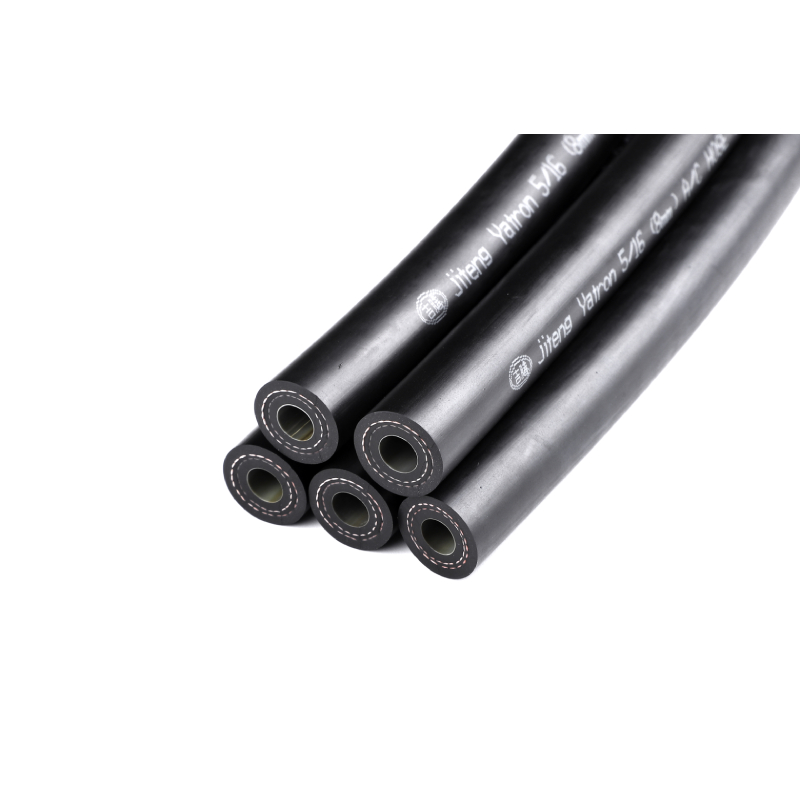Flexible Oil Hoses for Efficient Fluid Transfer in Industrial and Automotive Applications
កក្កដា . 29, 2024 21:33 Back to list
Flexible Oil Hoses for Efficient Fluid Transfer in Industrial and Automotive Applications
The Importance of Oil Hoses in Modern Industry
Oil hoses are integral components in a wide array of industries, from manufacturing and construction to agriculture and automotive sectors. These specialized hoses are designed to transport oil safely and efficiently, playing a crucial role in various applications, including machinery lubrication, fuel transfer, and hydraulic systems. This article explores the significance of oil hoses, their construction, types, and best practices for maintenance.
Construction and Design
Oil hoses are typically constructed from materials that can withstand high pressures and harsh chemical environments. Common materials include rubber, thermoplastics, and metal, often reinforced with braided fibers to enhance durability and flexibility. The design of oil hoses varies based on their specific applications, which may require different diameters, lengths, and pressure ratings. For example, hoses used in hydraulic systems will need to accommodate higher pressures compared to those used for fuel transfer.
The inner lining is crucial as it must resist the corrosive effects of oil and other fluids while minimizing friction that could impede flow. Additionally, the outer layer often features weather-resistant properties, protecting the hose from environmental factors like UV rays, ozone, and extreme temperatures.
Types of Oil Hoses
There are several types of oil hoses, each tailored for specific applications
. Two common categories are suction hoses and discharge hoses. Suction hoses are generally used for drawing oil from a source, such as a storage tank, while discharge hoses are employed to transfer oil from one location to another.Moreover, there are hoses designed for specific types of oil, such as hydraulic oil, motor oil, and fuel oil. Each type has unique requirements regarding temperature tolerance, pressure ratings, and flexibility. Oil hoses used in industrial applications typically have higher specifications compared to those meant for residential use.
Applications
oil hose

Oil hoses are utilized in a plethora of applications. In the automotive industry, they are critical for delivering engine oil, coolant, and fuel, ensuring that vehicles operate smoothly. In industrial settings, they facilitate the efficient operation of machinery by conveying lubricants and hydraulic fluids.
Moreover, in agriculture, oil hoses are utilized in refueling farm equipment and vehicles, ensuring uninterrupted operations during busy harvest seasons. Their versatility makes them essential for any operation that involves oil and requires safe transportation methods.
Maintenance and Safety
Like all equipment, oil hoses require regular maintenance to ensure longevity and safety. Inspecting hoses for signs of wear, such as cracks, abrasions, or bulges, is paramount. Any compromised hose should be replaced immediately to prevent leaks, which can lead to environmental hazards and safety risks.
Proper installation is also crucial. Ensuring that hoses are correctly secured and positioned reduces the likelihood of damage and enhances performance. Additionally, employing the right fittings and clamps is necessary to maintain the integrity of the connection points and prevent leaks.
Regular cleaning of oil hoses is also recommended, especially in environments where contaminants may accumulate. Using appropriate cleaning agents and methods will help prolong the life of the hoses and maintain fluid quality.
Conclusion
In conclusion, oil hoses are vital components across various industries, ensuring the safe and efficient transport of oil and hydraulic fluids. Their construction is designed to withstand challenging environments, and regular maintenance is essential to ensure their functionality and safety. By understanding the importance of oil hoses, industries can better appreciate their role in facilitating operations and maintaining equipment integrity, ultimately contributing to productivity and safety in the workplace. As technology advances, we can expect further innovations in hose design and materials, enhancing their effectiveness and reliability in the years to come.
